Samir Madhavan - Mastering Python for data science : explore the world of data science through Python and learn how to make sense of data
Here you can read online Samir Madhavan - Mastering Python for data science : explore the world of data science through Python and learn how to make sense of data full text of the book (entire story) in english for free. Download pdf and epub, get meaning, cover and reviews about this ebook. City: Brimingham, UK, year: 2015, publisher: Packt Publishing, genre: Computer. Description of the work, (preface) as well as reviews are available. Best literature library LitArk.com created for fans of good reading and offers a wide selection of genres:
Romance novel
Science fiction
Adventure
Detective
Science
History
Home and family
Prose
Art
Politics
Computer
Non-fiction
Religion
Business
Children
Humor
Choose a favorite category and find really read worthwhile books. Enjoy immersion in the world of imagination, feel the emotions of the characters or learn something new for yourself, make an fascinating discovery.
- Book:Mastering Python for data science : explore the world of data science through Python and learn how to make sense of data
- Author:
- Publisher:Packt Publishing
- Genre:
- Year:2015
- City:Brimingham, UK
- Rating:4 / 5
- Favourites:Add to favourites
- Your mark:
Mastering Python for data science : explore the world of data science through Python and learn how to make sense of data: summary, description and annotation
We offer to read an annotation, description, summary or preface (depends on what the author of the book "Mastering Python for data science : explore the world of data science through Python and learn how to make sense of data" wrote himself). If you haven't found the necessary information about the book — write in the comments, we will try to find it.
Explore the world of data science through Python and learn how to make sense of data
About This Book- Master data science methods using Python and its libraries
- Create data visualizations and mine for patterns
- Advanced techniques for the four fundamentals of Data Science with Python - data mining, data analysis, data visualization, and machine learning
If you are a Python developer who wants to master the world of data science then this book is for you. Some knowledge of data science is assumed.
What You Will Learn- Manage data and perform linear algebra in Python
- Derive inferences from the analysis by performing inferential statistics
- Solve data science problems in Python
- Create high-end visualizations using Python
- Evaluate and apply the linear regression technique to estimate the relationships among variables.
- Build recommendation engines with the various collaborative filtering algorithms
- Apply the ensemble methods to improve your predictions
- Work with big data technologies to handle data at scale
Data science is a relatively new knowledge domain which is used by various organizations to make data driven decisions. Data scientists have to wear various hats to work with data and to derive value from it. The Python programming language, beyond having conquered the scientific community in the last decade, is now an indispensable tool for the data science practitioner and a must-know tool for every aspiring data scientist. Using Python will offer you a fast, reliable, cross-platform, and mature environment for data analysis, machine learning, and algorithmic problem solving.
This comprehensive guide helps you move beyond the hype and transcend the theory by providing you with a hands-on, advanced study of data science.
Beginning with the essentials of Python in data science, you will learn to manage data and perform linear algebra in Python. You will move on to deriving inferences from the analysis by performing inferential statistics, and mining data to reveal hidden patterns and trends. You will use the matplot library to create high-end visualizations in Python and uncover the fundamentals of machine learning. Next, you will apply the linear regression technique and also learn to apply the logistic regression technique to your applications, before creating recommendation engines with various collaborative filtering algorithms and improving your predictions by applying the ensemble methods.
Finally, you will perform K-means clustering, along with an analysis of unstructured data with different text mining techniques and leveraging the power of Python in big data analytics.
Style and approachThis book is an easy-to-follow, comprehensive guide on data science using Python. The topics covered in the book can all be used in real world scenarios.
Samir Madhavan: author's other books
Who wrote Mastering Python for data science : explore the world of data science through Python and learn how to make sense of data? Find out the surname, the name of the author of the book and a list of all author's works by series.

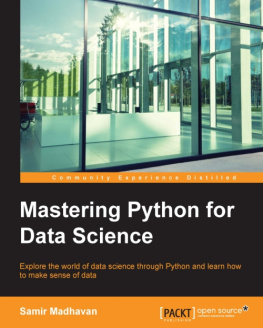

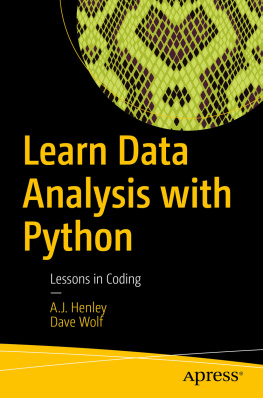
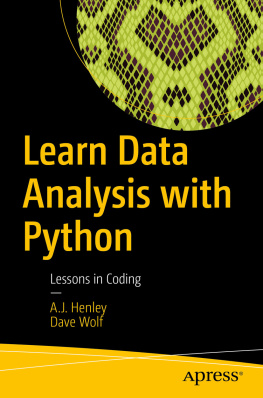
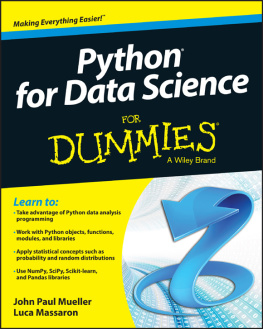
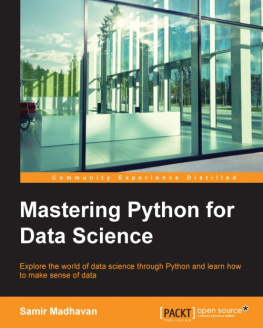
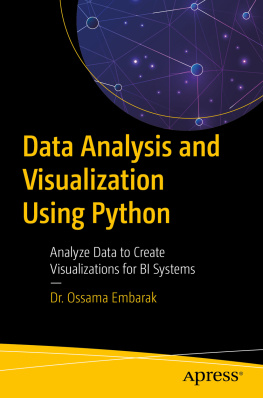
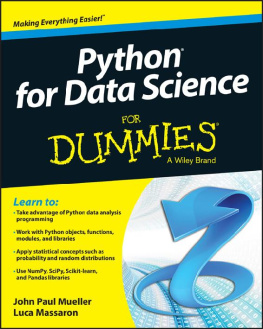
![Samir Madhavan [Samir Madhavan] - Mastering Python for Data Science](/uploads/posts/book/119623/thumbs/samir-madhavan-samir-madhavan-mastering-python.jpg)